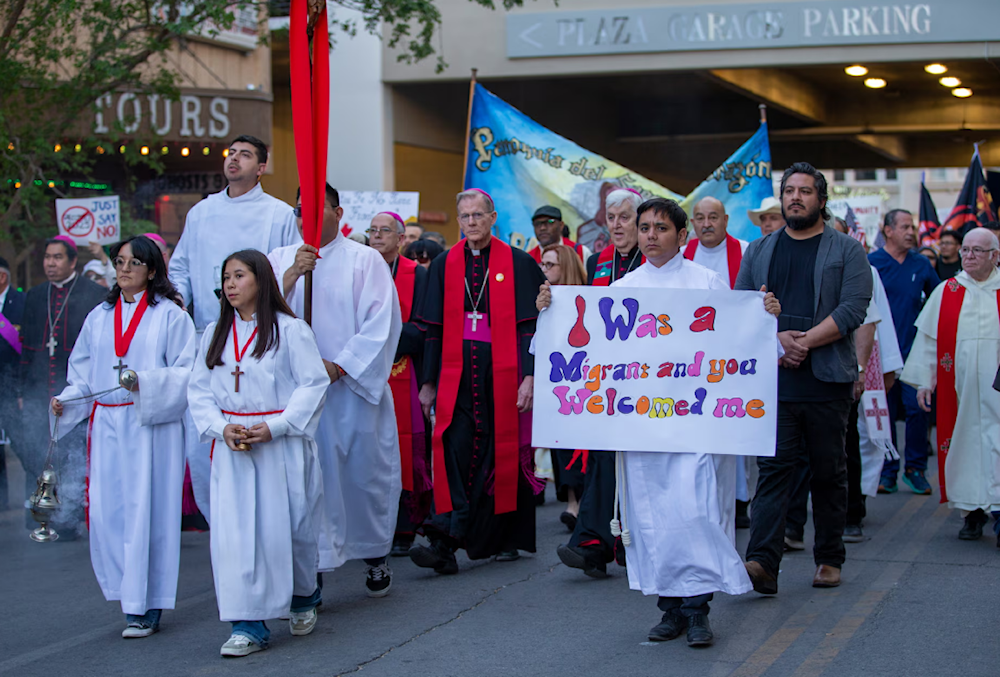US bishops halt aid partnerships with government due to funding cuts
The US Conference of Catholic Bishops announced it will end its 50-year partnership with the federal government on refugee services due to the Trump administration's funding halt.
-

Catholic bishops lead a march in solidarity with migrants in El Paso, Texas, March 2, 2025. (AP)
The US Conference of Catholic Bishops (USCCB) announced on Monday that it is ending a half-century of partnerships with the federal government to serve refugees and children, saying the “heartbreaking” decision follows the Trump administration’s abrupt halt of funding for refugee resettlement.
The break will inevitably result in fewer services than Catholic agencies were able to offer in the past to the needy, the bishops said. The Catholic bishops oversaw one of 10 national agencies, most of them faith-based, which contracted with the federal government to resettle refugees who come to the US legally after being vetted and approved by the federal government.
The USCCB website states that its Migration and Refugee Services “is the largest refugee resettlement agency in the world,” and that in partnership with its 65 affiliates, it resettles approximately 18% of the refugees that arrive in the US each year.
A report released by the U.S. Bishops, in collaboration with Protestant Churches and organizations, highlights that one in twelve Christians in the United States is either vulnerable to deportation or lives with someone who is, and calls on Christians to stand with their fellow…
— Vatican News (@VaticanNews) April 7, 2025
Catholic bishops sued US President Donald Trump’s administration in February over its abrupt halt to the funding of aid provided to newly arrived refugees, saying they are owed millions already allocated by Congress to carry out resettlement aid under an agreement with the federal government.
At the time, the USCCB's Migration and Refugee Services had sent layoff notices to 50 workers, more than half its staff, with additional cuts expected in local Catholic Charities offices that partner with the national office, the lawsuit said.
A federal judge determined that he was unable to compel the government to pay the money owed under the contract, stating that such a contractual dispute should be addressed in the Court of Federal Claims. The bishops have since appealed this decision.
Budget cuts, layoffs
The bishops have overseen Catholic agencies resettling displaced people for a century. In recent decades, they had done so in a partnership with the US government, receiving grants that covered much, though not all, of the expenses.
“As a national effort, we simply cannot sustain the work on our own at current levels or in current form,” said US military services archbishop Timothy Broglio, president of the USCCB. “We will work to identify alternative means of support for the people the federal government has already admitted to these programs. We ask your prayers for the many staff and refugees impacted.”
Despite Broglio’s asking for prayers for the “many staff and refugees impacted”, the announcement did not specify whether the cuts would lead to more layoffs.
In January 2025, JD Vance, a Catholic convert, criticized the USCCB's stance on immigration, accusing the bishops of resettling "illegal immigrants" to receive federal funding. He justified his position by referencing the medieval Catholic concept of "ordo amoris," suggesting a hierarchy of care that prioritizes family and community over strangers. This interpretation was contested by theologians and church leaders, including Pope Francis, who emphasized that Christian charity requires helping all in need, not just those within one's immediate circles.
Exacerbating the problem is the Trump administration’s halt to all new refugee arrivals. Last month, the Trump administration halted certain green card applications for refugees and asylum seekers, citing national security concerns, which has led to delays in permanent residency and raised fears of deportation.
The programs will shut down by the end of the fiscal year, which on the federal calendar is the end of September 2025, Broglio added in a Washington Post commentary. The decision means the bishops won’t be renewing existing agreements with the federal government.

 4 Min Read
4 Min Read










